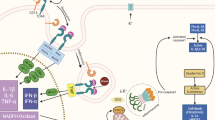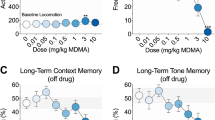Abstract
Rationale
The contribution of norepinephrine on the different phases of spatial memory processing remains incompletely understood. To address this gap, this study depleted norepinephrine in the brain and then conducted a spatial learning task with multiple phases.
Methods
Male and female Wistar rats were administered 50 mg/kg/i.p. of DSP-4 (N-(2-chloroethyl)-N-ethyl-2-bromobenzylamine) to deplete norepinephrine. After 10 days, rats were trained on a 20-hole Barnes maze spatial navigation task for 5 days. On the fifth day, animals were euthanized and HPLC was used to confirm depletion of norepinephrine in select brain regions. In Experiment 2, rats underwent a similar Barnes maze procedure that continued beyond day 5 to investigate memory retrieval and updating via a single probe trial and two reversal learning periods.
Results
Rats did not differ in Barnes maze acquisition between DSP-4 and saline-injected rats; however, initial acquisition differed between the sexes. HPLC analysis confirmed selective depletion of norepinephrine in dorsal hippocampus and cingulate cortex without impact to other monoamines. When retrieval was tested through a probe trial, DSP-4-improved memory retrieval in males but impaired it in females. Cognitive flexibility was transiently impacted by DSP-4 in males only.
Conclusions
Despite significantly reducing levels of norepinephrine, DSP-4 had only a modest impact on spatial learning and behavioral flexibility. Memory retrieval and early reversal learning were most affected and in a sex-specific manner. These data suggest that norepinephrine has sex-specific neuromodulatory effects on memory retrieval with a lesser effect on cognitive flexibility and no impact on acquisition of learned behavior.





Similar content being viewed by others
Data availability
The datasets generated during and/or analysed during the current study are available from the corresponding author on reasonable request.
References
Arnsten AFT (2000) Through the looking glass: differential noradenergic modulation of prefrontal cortical function. Neural Plasticity 7:609619. https://doi.org/10.1155/NP.2000.133
Aston-Jones G, Cohen JD (2005) An integrative theory of locus coeruleus-norepinephrine function: adaptive gain and optimal performance. Annu Rev Neurosci 28:403–450. https://doi.org/10.1146/annurev.neuro.28.061604.135709
Aston-Jones G, Rajkowski J, Kubiak P (1997) Conditioned responses of monkey locus coeruleus neurons anticipate acquisition of discriminative behavior in a vigilance task. Neuroscience 80(3):697–715. https://doi.org/10.1016/s0306-4522(97)00060-2
Bangasser DA, Wiersielis KR, Khantsis S (2016) Sex differences in the locus coeruleus-norepinephrine system and its regulation by stress. Brain Res 1641(Pt B):177–188. https://doi.org/10.1016/j.brainres.2015.11.021
Beck KD, Luine VN (2010) Evidence for sex-specific shifting of neural processes underlying learning and memory following stress. Physiol Behav 99(2):204–211. https://doi.org/10.1016/j.physbeh.2009.04.011
Berridge CW, Waterhouse BD (2003) The locus coeruleus-noradrenergic system: modulation of behavioral state and state-dependent cognitive processes. Brain Res Brain Res Rev 42(1):33–84. https://doi.org/10.1016/s0165-0173(03)00143-7
Bouret S, Sara SJ (2005) Network reset: a simplified overarching theory of locus coeruleus noradrenaline function. Trends Neurosci 28(11):574–582. https://doi.org/10.1016/j.tins.2005.09.002
Breton-Provencher V, Drummond GT, Sur M (2021) Locus coeruleus norepinephrine in learned behavior: anatomical modularity and spatiotemporal integration in targets. Front Neural Circuits 15:638007. https://doi.org/10.3389/fncir.2021.638007
Cardenas A, Papadogiannis A, Dimitrov E (2021) The role of medial prefrontal cortex projections to locus ceruleus in mediating the sex differences in behavior in mice with inflammatory pain. FASEB J 35(7):e21747. https://doi.org/10.1096/fj.202100319RR
Chae WR, Metz S, Weise J, Nowacki J, Piber D, Mueller SC et al (2019) Effects of glucocorticoid and noradrenergic activity on spatial learning and spatial memory in healthy young adults. Behav Brain Res 373:112072. https://doi.org/10.1016/j.bbr.2019.112072
Chalermpalanupap T, Schroeder JP, Rorabaugh JM, Liles LC, Lah JJ, Levey AI, Weinshenker D (2018) Locus coeruleus ablation exacerbates cognitive deficits, neuropathology, and lethality in P301S tau transgenic mice. J Neurosci 38(1):74–92. https://doi.org/10.1523/jneurosci.1483-17.2017
Chu N, Bloom FE (1973) Norepinephrine-containing neurons: changes in spontaneous discharge patterns during slee** and waking. Science 179(4076):908–910. https://doi.org/10.1126/science.179.4076.908
Council NR (2011) Guide for the Care and Use of Laboratory Animals: Eighth Edition. (T. N. A. Press Ed.)
Davidson CJ, Svenson DW, Hannigan JH, Perrine SA, Bowen SE (2022) A novel preclinical model of environment-like combined benzene, toluene, ethylbenzene, and xylenes (BTEX) exposure: Behavioral and neurochemical findings. Neurotoxicol Teratol 91:107076. https://doi.org/10.1016/j.ntt.2022.107076
Gaulden AD, Burson N, Sadik N, Ghosh I, Khan SJ, Brummelte S et al (2021) Effects of fentanyl on acute locomotor activity, behavioral sensitization, and contextual reward in female and male rats. Drug Alcohol Depend 229(Pt A):109101. https://doi.org/10.1016/j.drugalcdep.2021.109101
Glennon E, Carcea I, Martins ARO, Multani J, Shehu I, Svirsky MA, Froemke RC (2019) Locus coeruleus activation accelerates perceptual learning. Brain Res 1709:39–49. https://doi.org/10.1016/j.brainres.2018.05.048
Grella SL, Gomes SM, Lackie RE, Renda B, Marrone DF (2021) Norepinephrine as a spatial memory reset signal. Behav Pharmacol 32(7):531–548. https://doi.org/10.1097/fbp.0000000000000648
Hamlett ED, Ledreux A, Gilmore A, Vazey EM, Aston-Jones G, Boger HA et al (2020) Inhibitory designer receptors aggravate memory loss in a mouse model of down syndrome. Neurobiol Dis 134:104616. https://doi.org/10.1016/j.nbd.2019.104616
Hansen N (2017) The longevity of hippocampus-dependent memory is orchestrated by the locus coeruleus-noradrenergic system. Neural Plast 2017:2727602. https://doi.org/10.1155/2017/2727602
Hauser J, Sontag TA, Tucha O, Lange KW (2012) The effects of the neurotoxin DSP4 on spatial learning and memory in Wistar rats. Atten Defic Hyperact Disord 4(2):93–99. https://doi.org/10.1007/s12402-012-0076-4
Hermans EJ, van Marle HJ, Ossewaarde L, Henckens MJ, Qin S, van Kesteren MT et al (2011) Stress-related noradrenergic activity prompts large-scale neural network reconfiguration. Science 334(6059):1151–1153. https://doi.org/10.1126/science.1209603
Hormigo S, Gómez-Nieto R, Sancho C, Herrero-Turrión J, Carro J, López DE, Horta-Júnior J (2017) Morphological correlates of sex differences in acoustic startle response and prepulse inhibition through projections from locus coeruleus to cochlear root neurons. Brain Struct Funct 222(8):3491–3508. https://doi.org/10.1007/s00429-017-1415-1
Hou L, Sun F, Sun W, Zhang L, Wang Q (2019) Lesion of the locus coeruleus damages learning and memory performance in paraquat and maneb-induced pouse Parkinson’s disease model. Neuroscience 419:129–140. https://doi.org/10.1016/j.neuroscience.2019.09.006
Iannitelli AF, Kelberman MA, Lustberg DJ, Korukonda A, McCann KE, Mulvey B, . . . Weinshenker D (2022) The neurotoxin DSP-4 dysregulates the locus coeruleus-norepinephrine system and recapitulates molecular and behavioral aspects of prodromal neurodegenerative disease. bioRxiv. https://doi.org/10.1101/2022.09.27.509797
Jackisch R, Gansser S, Cassel JC (2008) Noradrenergic denervation facilitates the release of acetylcholine and serotonin in the hippocampus: towards a mechanism underlying upregulations described in MCI patients? Exp Neurol 213(2):345–353. https://doi.org/10.1016/j.expneurol.2008.06.011
Kelberman MA, Anderson CR, Chlan E, Rorabaugh JM, McCann KE, Weinshenker D (2022) Consequences of hyperphosphorylated tau in the locus coeruleus on behavior and cognition in a rat model of Alzheimer’s disease. J Alzheimers Dis 86(3):1037–1059. https://doi.org/10.3233/jad-215546
Kempadoo KA, Mosharov EV, Choi SJ, Sulzer D, Kandel ER (2016) Dopamine release from the locus coeruleus to the dorsal hippocampus promotes spatial learning and memory. Proc Natl Acad Sci U S A 113(51):14835–14840. https://doi.org/10.1073/pnas.1616515114
Khakpour-Taleghani B, Lashgari R, Motamedi F, Naghdi N (2009) Effect of reversible inactivation of locus ceruleus on spatial reference and working memory. Neuroscience 158(4):1284–1291. https://doi.org/10.1016/j.neuroscience.2008.11.001
Lisieski MJ, Karavidha K, Gheidi A, Garibyan RL, Conti AC, Morrow JD, Perrine SA (2019) Divergent effects of repeated cocaine and novel environment exposure on locus coeruleus c-fos expression and brain catecholamine concentrations in rats. Brain Behav 9(3):e01222. https://doi.org/10.1002/brb3.1222
Locklear MN, Kritzer MF (2014) Assessment of the effects of sex and sex hormones on spatial cognition in adult rats using the Barnes maze. Horm Behav 66(2):298–308. https://doi.org/10.1016/j.yhbeh.2014.06.006
Mau W, Hasselmo ME, Cai DJ (2020) The brain in motion: how ensemble fluidity drives memory-updating and flexibility. Elife 9. https://doi.org/10.7554/eLife.63550
Mei X, Wang L, Yang B, Li X (2021) Sex differences in noradrenergic modulation of attention and impulsivity in rats. Psychopharmacology 238(8):2167–2177. https://doi.org/10.1007/s00213-021-05841-8
Moser EI, Moser MB, McNaughton BL (2017) Spatial representation in the hippocampal formation: a history. Nat Neurosci 20(11):1448–1464. https://doi.org/10.1038/nn.4653
Murchison CF, Zhang XY, Zhang WP, Ouyang M, Lee A, Thomas SA (2004) A distinct role for norepinephrine in memory retrieval. Cell 117(1):131–143. https://doi.org/10.1016/s0092-8674(04)00259-4
Nowak P (2016) Selective lifelong destruction of brain monoaminergic nerves through perinatal DSP-4 treatment. Curr Top Behav Neurosci 29:51–71. https://doi.org/10.1007/7854_2015_398
Osorio-Gómez D, Miranda MI, Guzmán-Ramos K, Bermúdez-Rattoni F (2023) Transforming experiences: neurobiology of memory updating/editing. Front Syst Neurosci 17:1103770. https://doi.org/10.3389/fnsys.2023.1103770
Pau KY, Hess DL, Kohama S, Bao J, Pau CY, Spies HG (2000) Oestrogen upregulates noradrenaline release in the mediobasal hypothalamus and tyrosine hydroxylase gene expression in the brainstem of ovariectomized rhesus macaques. J Neuroendocrinol 12(9):899–909. https://doi.org/10.1046/j.1365-2826.2000.00549.x
Poe GR, Foote S, Eschenko O, Johansen JP, Bouret S, Aston-Jones G et al (2020) Locus coeruleus: a new look at the blue spot. Nat Rev Neurosci 21(11):644–659. https://doi.org/10.1038/s41583-020-0360-9
Ross SB, Stenfors C (2015) DSP4, a selective neurotoxin for the locus coeruleus noradrenergic system. A review of its mode of action. Neurotox Res 27(1):15–30. https://doi.org/10.1007/s12640-014-9482-z
Sara SJ, Bouret S (2012) Orienting and reorienting: the locus coeruleus mediates cognition through arousal. Neuron 76(1):130–141. https://doi.org/10.1016/j.neuron.2012.09.011
Saucier DM, Shultz SR, Keller AJ, Cook CM, Binsted G (2008) Sex differences in object location memory and spatial navigation in Long-Evans rats. Anim Cogn 11(1):129–137. https://doi.org/10.1007/s10071-007-0096-1
Segal SK, Stark SM, Kattan D, Stark CE, Yassa MA (2012) Norepinephrine-mediated emotional arousal facilitates subsequent pattern separation. Neurobiol Learn Mem 97(4):465–469. https://doi.org/10.1016/j.nlm.2012.03.010
Shakhawat AM, Gheidi A, MacIntyre IT, Walsh ML, Harley CW, Yuan Q (2015) Arc-expressing neuronal ensembles supporting pattern separation require adrenergic activity in anterior piriform cortex: an exploration of neural constraints on learning. J Neurosci 35(41):14070–14075. https://doi.org/10.1523/jneurosci.2690-15.2015
Sirviö J, Riekkinen P Jr, Valjakka A, Jolkkonen J, Riekkinen PJ (1991) The effects of noradrenergic neurotoxin, DSP-4, on the performance of young and aged rats in spatial navigation task. Brain Res 563(1-2):297–302. https://doi.org/10.1016/0006-8993(91)91550-k
Sontag TA, Hauser J, Tucha O, Lange KW (2011) Effects of DSP4 and methylphenidate on spatial memory performance in rats. Atten Defic Hyperact Disord 3(4):351–358. https://doi.org/10.1007/s12402-011-0067-x
Swift KM, Gross BA, Frazer MA, Bauer DS, Clark KJD, Vazey EM et al (2018) Abnormal locus coeruleus sleep activity alters sleep signatures of memory consolidation and impairs place cell stability and spatial memory. Curr Biol 28(22):3599–3609.e3594. https://doi.org/10.1016/j.cub.2018.09.054
Uematsu A, Tan BZ, Johansen JP (2015) Projection specificity in heterogeneous locus coeruleus cell populations: implications for learning and memory. Learn Mem 22(9):444–451. https://doi.org/10.1101/lm.037283.114
Walling SG, Milway JS, Ingram M, Lau C, Morrison G, Martin GM (2016) The effects of prolonged administration of norepinephrine reuptake inhibitors on long-term potentiation in dentate gyrus, and on tests of spatial and object recognition memory in rats. Neurobiol Learn Mem 128:92–102. https://doi.org/10.1016/j.nlm.2015.12.013
Wolfman C, Abó V, Calvo D, Medina J, Dajas F, Silveira R (1994) Recovery of central noradrenergic neurons one year after the administration of the neurotoxin DSP4. Neurochem Int 25(4):395–400. https://doi.org/10.1016/0197-0186(94)90147-3
Acknowledgements
We would like to acknowledge Dr. Garry Aston-Jones for his discussions with the authors and intellectual contributions to this manuscript. Additionally, we would like to acknowledge the contribution of the staff of the Wayne State University Department of Laboratory Animals for their maintenance of our subject’s health and wellbeing during these experiments.
Funding
National Institutes of Health: R01-DA-042057 [SAP], R21-DA-052657 [SAP], K01-DA-055068, Mercer University Seed Fund [AG], T32-GM-139807 [ATM, SAP]; Office of Vice President for Research, Wayne State University [CJD, SAP]
Author information
Authors and Affiliations
Corresponding author
Ethics declarations
Conflict of interest
The authors declare no competing interests.
Additional information
Publisher’s note
Springer Nature remains neutral with regard to jurisdictional claims in published maps and institutional affiliations.
Rights and permissions
Springer Nature or its licensor (e.g. a society or other partner) holds exclusive rights to this article under a publishing agreement with the author(s) or other rightsholder(s); author self-archiving of the accepted manuscript version of this article is solely governed by the terms of such publishing agreement and applicable law.
About this article
Cite this article
Gheidi, A., Davidson, C.J., Simpson, S.C. et al. Norepinephrine depletion in the brain sex-dependently modulates aspects of spatial learning and memory in female and male rats. Psychopharmacology 240, 2585–2595 (2023). https://doi.org/10.1007/s00213-023-06453-0
Received:
Accepted:
Published:
Issue Date:
DOI: https://doi.org/10.1007/s00213-023-06453-0




